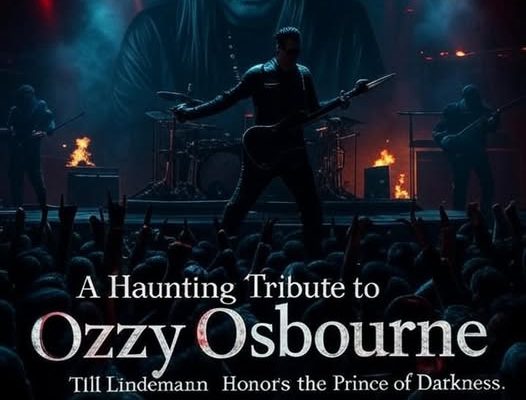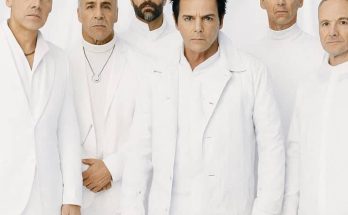Rammstein’s Till Lindemann Pays Haunting Tribute to Ozzy Osbourne
When one titan of heavy music salutes another, the echoes travel far beyond the concert stage. Such was the case when Till Lindemann, the enigmatic and often controversial frontman of the German industrial juggernaut Rammstein, delivered a haunting and unforgettable tribute to none other than Ozzy Osbourne, the Prince of Darkness himself. This tribute was not simply a cover song or a passing mention; it was a deeply atmospheric and theatrical performance that wove together respect, intensity, and the shared spirit of rebellion that defines both artists’ legacies. In a career built on provocation, fire, and boundary-pushing spectacle, Lindemann managed to stop his audience in their tracks with a moment of raw homage that seemed to transcend time, reminding everyone in attendance that even the wildest performers are still shaped by their idols.
Ozzy Osbourne’s shadow looms large over the history of rock and metal. As the founding voice of Black Sabbath, he helped invent heavy metal as a genre, pioneering riffs, tones, and lyrical darkness that would inspire entire generations of musicians. His solo career only cemented his legendary status, with albums like Blizzard of Ozz and Diary of a Madman becoming sacred texts in the church of heavy metal. For decades, Ozzy has been celebrated not only for his music but also for his uncompromising persona: chaotic, theatrical, self-destructive, and yet strangely endearing. It is no wonder that Lindemann, who himself has built a reputation for pushing boundaries onstage and off, would feel a kinship with Osbourne. Both men share a theatrical sensibility, a love of shock and awe, and an understanding that music is more than sound—it is ritual, drama, and spectacle.
The tribute took place in a concert hall filled with anticipation, where Rammstein’s usual arsenal of fire, steel, and explosive power was temporarily subdued in favor of a more haunting and intimate atmosphere. Lindemann emerged from the shadows dressed in somber tones, stripped of some of the more elaborate costumery that fans have come to expect. Instead, the focus was squarely on the song, the man, and the legacy he sought to honor. The opening notes drifted across the venue, instantly recognizable yet reimagined through Lindemann’s deep, guttural delivery. His voice, darker and heavier than Osbourne’s, gave the song an entirely new dimension, as if the tribute were less an imitation and more an invocation—calling forth Ozzy’s spirit through the medium of performance.
What made the moment so powerful was the balance between reverence and individuality. Many tributes stumble when the performer either tries to copy the original too closely or veers so far off course that the homage is lost. Lindemann walked a razor’s edge, using his unmistakable vocal tone and Germanic theatricality to transform the piece while still maintaining a deep fidelity to the essence of Ozzy’s music. Every syllable carried weight, and every pause lingered in the air like smoke. The lighting, too, was stripped down from the usual inferno of Rammstein’s pyrotechnics; instead, stark beams of white and blue illuminated Lindemann’s towering figure, casting long shadows that made the performance feel like a séance rather than a rock show.
Fans in attendance later described the experience as chilling, moving, and unforgettable. Many noted that Lindemann seemed almost possessed during the performance, channeling Osbourne not in mimicry but in spirit. Social media exploded with clips and commentary, with longtime Rammstein followers expressing surprise at the sheer emotional vulnerability Lindemann displayed. Known more for his bombastic presence and provocative antics, Lindemann rarely allows cracks in his iron-clad armor. Yet here he was, openly paying respect to a figure who helped pave the way for him, and doing so with a sincerity that resonated with audiences around the world.
For Ozzy Osbourne, the tribute arrives at a poignant moment in his life and career. In recent years, he has struggled with health issues that have curtailed his touring and forced him to confront the mortality that even rock gods cannot escape. Fans have often wondered whether his days of commanding a stage are behind him. To have someone of Lindemann’s stature acknowledge his influence in such a public and heartfelt manner is not just an artistic gesture but also a reminder that Osbourne’s legacy remains unshakable. It shows that the fire he lit decades ago continues to burn in the hearts of those who came after him, even those as singular and uncompromising as Rammstein’s frontman.
What makes this tribute even more fascinating is the interplay of aesthetics between the two artists. Ozzy’s world has always been steeped in gothic horror, occult imagery, and theatrical darkness, from biting the head off a bat to staging concerts filled with demonic iconography. Lindemann, by contrast, has leaned more into industrial brutality, mixing pyrotechnics with grotesque, surreal, and sometimes shocking theatrics. Yet when viewed side by side, one sees that both men share a belief in the transformative power of performance. They understand that audiences crave not just music but catharsis, a brush with something dangerous and primal. By paying homage to Ozzy, Lindemann was acknowledging a spiritual predecessor—a man who laid the foundation for the very kind of stagecraft Rammstein has perfected.
The performance also opened a wider conversation about the lineage of heavy music. Without Black Sabbath and Ozzy Osbourne, there would be no Rammstein, no industrial metal as we know it, and perhaps no global appetite for music that combines heaviness with theatricality. It was a reminder that all art is built on what came before, even when it feels entirely new. Lindemann’s tribute was not just a personal salute; it was an acknowledgment of history, of continuity, and of the unbroken chain of rebellion that links generations of musicians together.
Critics have noted that this gesture represents a softer side of Lindemann, one that fans rarely see. His solo work, often provocative and controversial, has occasionally overshadowed the raw humanity at the core of his artistry. By stepping onto the stage to honor Ozzy with such a haunting and heartfelt performance, he reminded audiences that beneath the armor of provocation lies a genuine respect for the art form and for those who came before. It was a rare moment of humility, and perhaps that is why it struck such a chord.
The future may hold more collaborations or tributes of this kind. With Osbourne’s health uncertain and Lindemann continuing to push boundaries in his solo career and with Rammstein, fans are left to wonder whether the two icons might someday share a stage, even in a limited capacity. The idea of Till Lindemann and Ozzy Osbourne performing together, bridging generations and styles, feels almost mythical. Whether or not that dream ever materializes, the tribute itself stands as a landmark event—a moment where the industrial fire of Germany met the dark Sabbath of Birmingham, and something unforgettable was born.
In the days after the performance, journalists and fans alike debated what it meant for Lindemann’s legacy. Was this a sign of the singer evolving, of him embracing his role as a bridge between the old guard and the new? Or was it simply an artist giving thanks to a personal hero in the most powerful way he knows how—through performance? The answer may be both. What cannot be denied is the impact: a global conversation, millions of views online, and a renewed appreciation for both men’s contributions to heavy music.
Rammstein has always thrived on spectacle, controversy, and excess. Yet in this moment, Lindemann showed that he is equally capable of restraint, reverence, and emotional depth. By paying haunting tribute to Ozzy Osbourne, he not only honored the Prince of Darkness but also revealed a new dimension of himself. It was less about theatrics and more about spirit, less about shock and more about respect. And in that balance, he created something that will likely be remembered for years to come.
As heavy metal continues to evolve and younger generations discover its roots, moments like this serve as important reminders of where it all began. The torch is always passed, whether consciously or not. Till Lindemann’s haunting tribute was not just about Ozzy Osbourne; it was about the unbreakable chain of influence that binds musicians across decades and continents. From Birmingham to Berlin, from Sabbath to Rammstein, the fire still burns—fueled by respect, haunted by memory, and destined to blaze on long after the original flames have dimmed.



